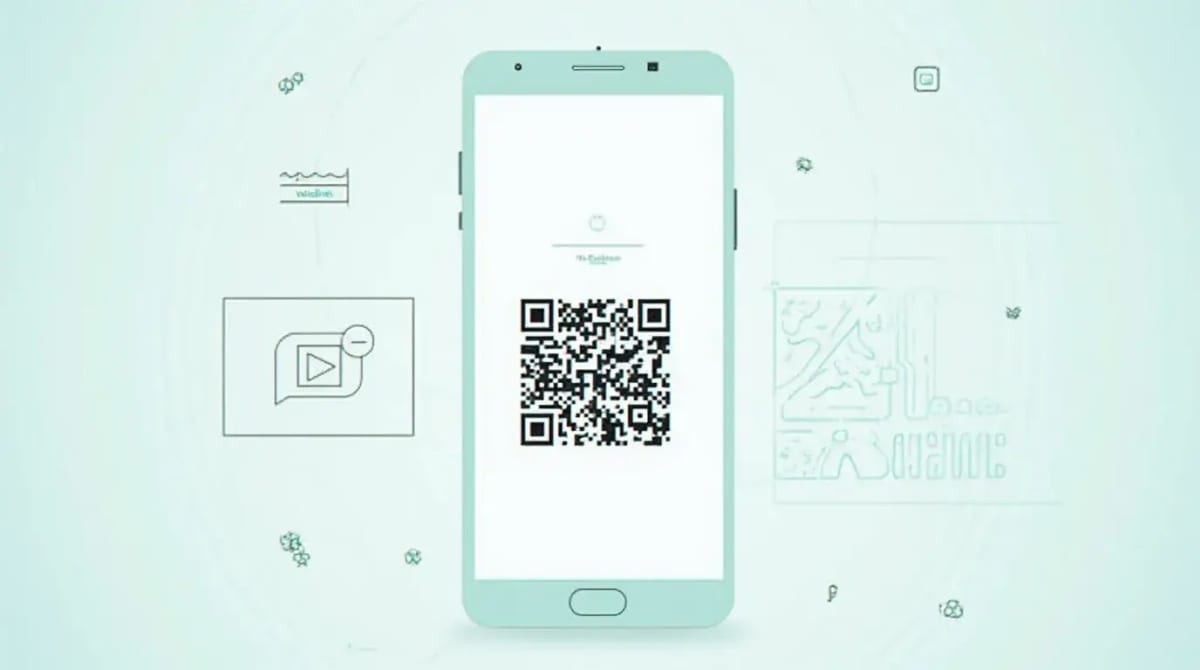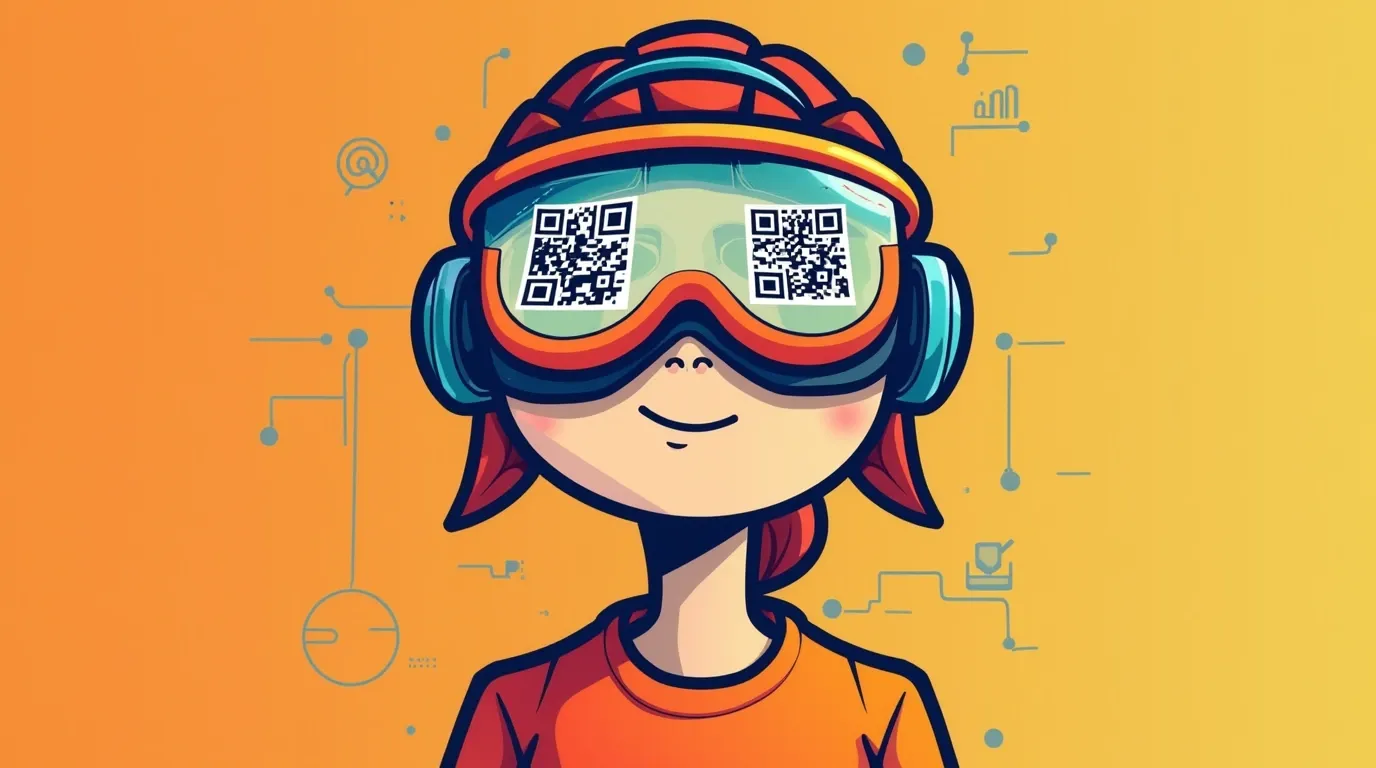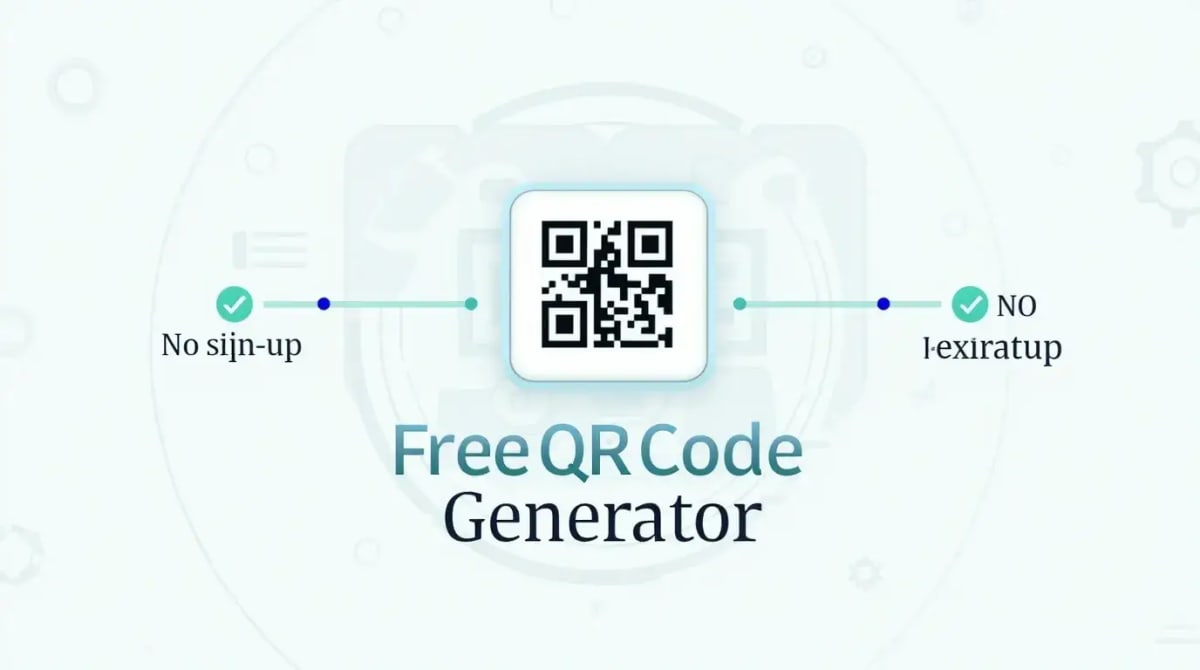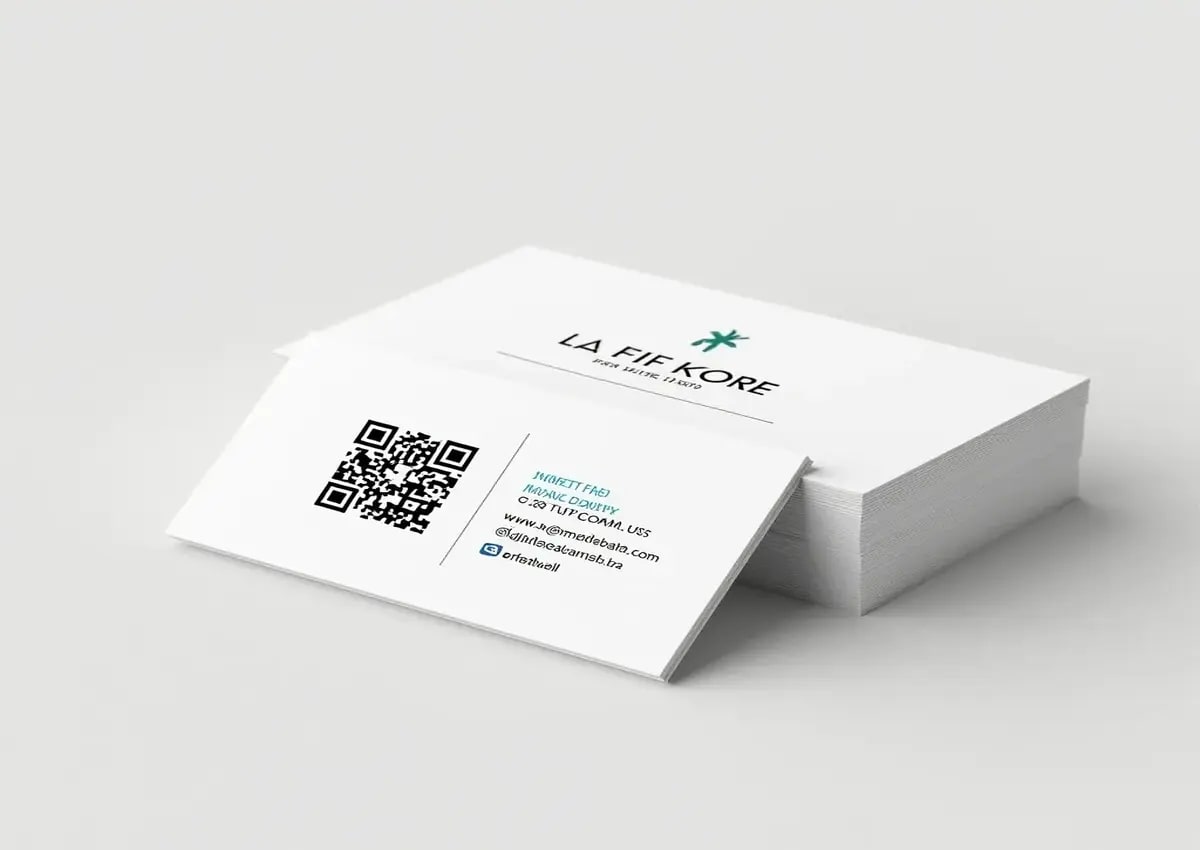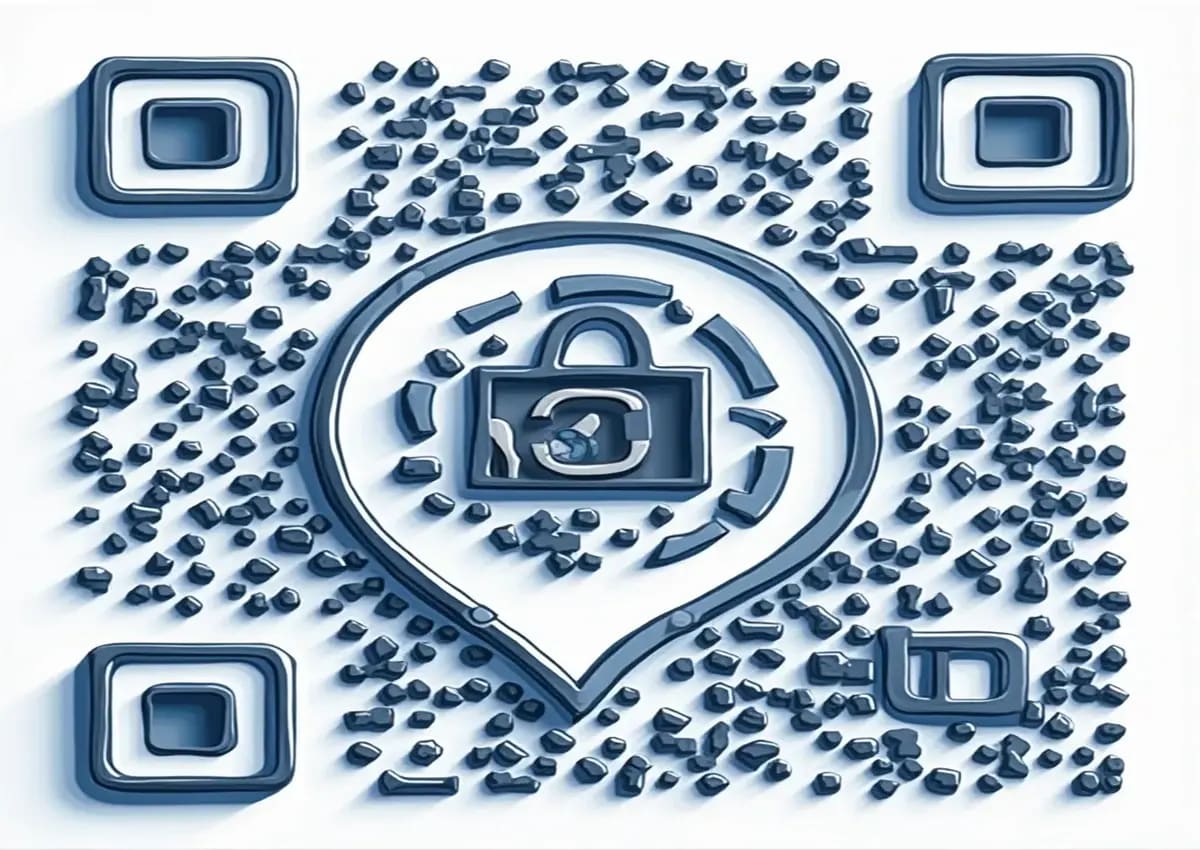
The Complete Guide to QR Codes: Creation, Usage & Best Practices
Last updated on: July 20, 2025
Introduction to QR Codes
What is a QR Code?
Quick Response (QR) codes are two-dimensional barcodes that can store a significant amount of information, such as URLs, contact details, or payment instructions. Originally developed in 1994 by Denso Wave, a subsidiary of Toyota, these codes were intended to track vehicle parts during manufacturing. Over time, their versatility led to widespread adoption in various industries.
A Brief History of QR Codes
The inception of QR codes was driven by the need for a more efficient system to replace traditional barcodes. Their ability to store more data and be scanned from any angle revolutionized how businesses managed inventory and logistics. The global proliferation of smartphones made them even more ubiquitous, turning them into everyday tools for accessing digital content seamlessly.
QR Code Fast Facts
- Can store up to 7,089 numeric characters or 4,296 alphanumeric characters
- Readable from any orientation (360° scanning)
- Can still be scanned with up to 30% damage
- Over 11 million QR codes are scanned daily in the US alone
How QR Codes Work
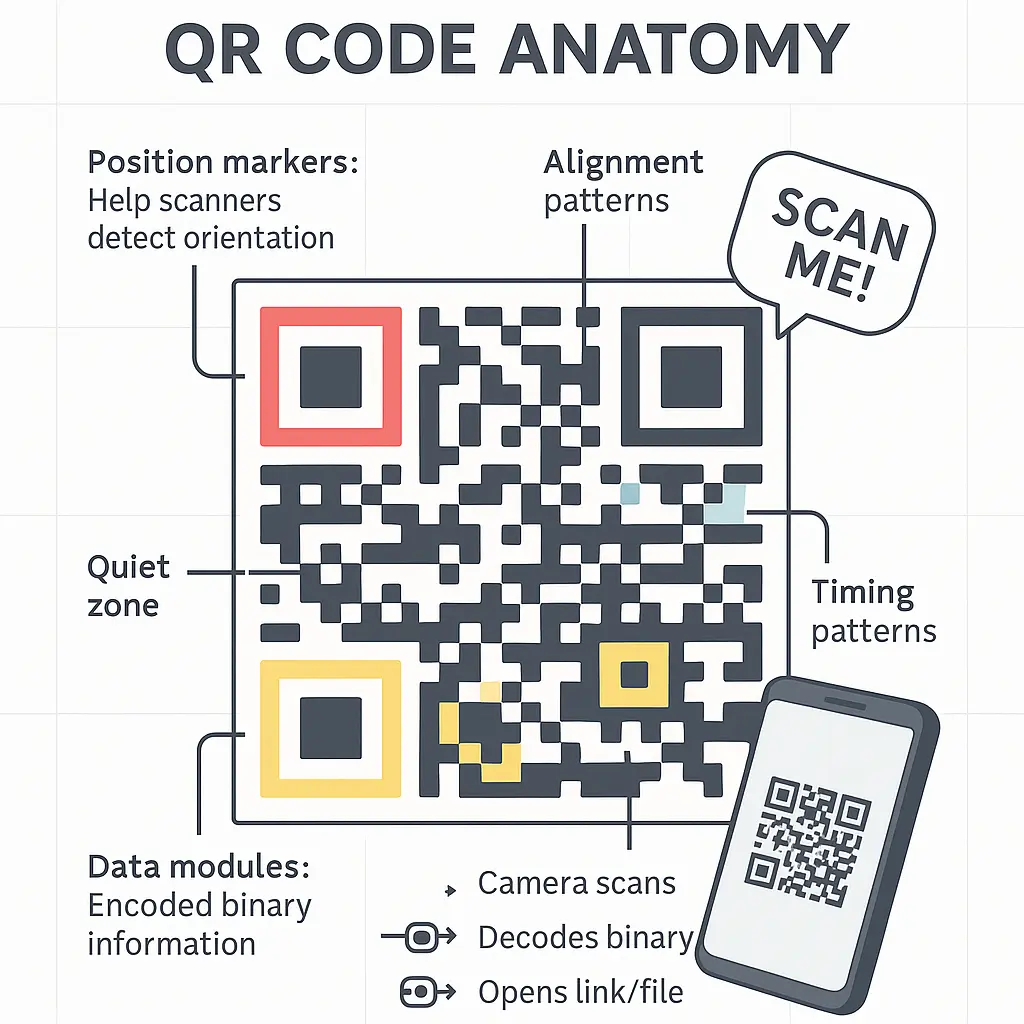
The Anatomy of a QR Code
A QR code consists of black squares and dots arranged on a white grid. Each pattern encodes information that scanners can interpret. Key elements include:
- Position markers: Three squares in corners help scanners detect the code's orientation
- Alignment patterns: Smaller squares that ensure proper scanning at different angles
- Timing patterns: L-shaped lines that help determine the data matrix size
- Data modules: The actual encoded information in binary format
- Quiet zone: Blank border essential for proper scanning
How Data is Stored and Retrieved
QR codes use binary data encoding with four standardized encoding modes:
- Numeric (0-9)
- Alphanumeric (0-9, A-Z, and some symbols)
- Byte/binary (ISO-8859-1 characters)
- Kanji (Japanese characters)
Error correction (using Reed-Solomon codes) allows QR codes to remain scannable even when partially damaged or obscured, with four correction levels available (7%-30% damage recovery).
Types of QR Codes
| Feature | Static QR Codes | Dynamic QR Codes |
|---|---|---|
| Editable after creation | No | Yes |
| Tracking capabilities | No | Yes (scans, locations, devices) |
| Best for | Permanent information (contact details, WiFi passwords) | Marketing campaigns, time-sensitive offers |
| Storage requirements | None after creation | Requires hosting service |
Static QR Codes
Static QR codes contain fixed information that cannot be changed after creation. They are ideal for:
- Business cards with contact information
- WiFi network access credentials
- Permanent product information links
- Fixed location markers (museum exhibits, real estate signs)
Dynamic QR Codes
Dynamic QR codes offer powerful features for businesses:
- Change destination URL without changing the printed code
- Track scan metrics in real-time (location, device, time)
- Set scan limits or expiration dates
- A/B test different landing pages
Create Your Own QR Code
Ready to make professional QR codes with tracking and analytics?
Try Our QR Code Generator →Applications of QR Codes
In Marketing and Advertising
Modern QR code marketing applications include:
- Product packaging linking to tutorials or recipes
- Billboards with instant coupon redemptions
- Business cards with portfolio links
- Event posters with ticket purchasing
- Retail displays with product comparisons
Enhancing Customer Experiences
Customer experience innovations:
- Restaurant menus with allergen information
- Hotel room codes for digital concierge services
- Product manuals with video tutorials
- Museum exhibits with augmented reality content
Streamlining Payments and Transactions
Financial applications have exploded globally:
- Mobile payment systems (Alipay, PayPal, Venmo)
- Peer-to-peer money transfers
- Cryptocurrency wallet addresses
- Bank statement verification
Advantages of Using QR Codes
Versatility Across Industries
Industry-specific implementations:
- Healthcare: Patient records, medication information
- Education: Textbook supplements, campus navigation
- Manufacturing: Equipment maintenance logs
- Transportation: Boarding passes, parcel tracking
Ease of Use and Accessibility
QR codes eliminate many traditional barriers:
- No app required on modern smartphones
- Language-independent visual interface
- Works without internet connection (for static content)
- Accessible for visually impaired (with audio QR scanners)
Challenges and Misuses of QR Codes
Potential Security Risks
Common security threats and prevention:
- QR phishing (quishing): Fake codes directing to malicious sites
- Malware distribution: Auto-download triggers
- Privacy concerns: Location tracking without consent
- Prevention: Use trusted generators, preview URLs before opening
Overuse and Ineffectiveness
Best practices to maintain effectiveness:
- Provide clear value proposition near the code
- Ensure adequate size (minimum 1.5" x 1.5" for print)
- Test scan reliability across devices
- Maintain high contrast (black on white works best)
Creating Your QR Code
Using a QR Code Generator
Professional QR code creation involves:
- Selecting content type (URL, vCard, WiFi, etc.)
- Choosing dynamic vs static based on needs
- Customizing design (colors, logo, frame)
- Setting error correction level (higher for logos)
- Testing across multiple devices
Best Practices for Effective QR Code Usage
Maximize engagement with these tips:
- Always include a CTA ("Scan to view menu")
- Place in natural scanning position (eye level)
- For print materials, provide short URL alternative
- Use dynamic codes to update outdated materials
- Monitor analytics to optimize placement
Advanced QR Code Features
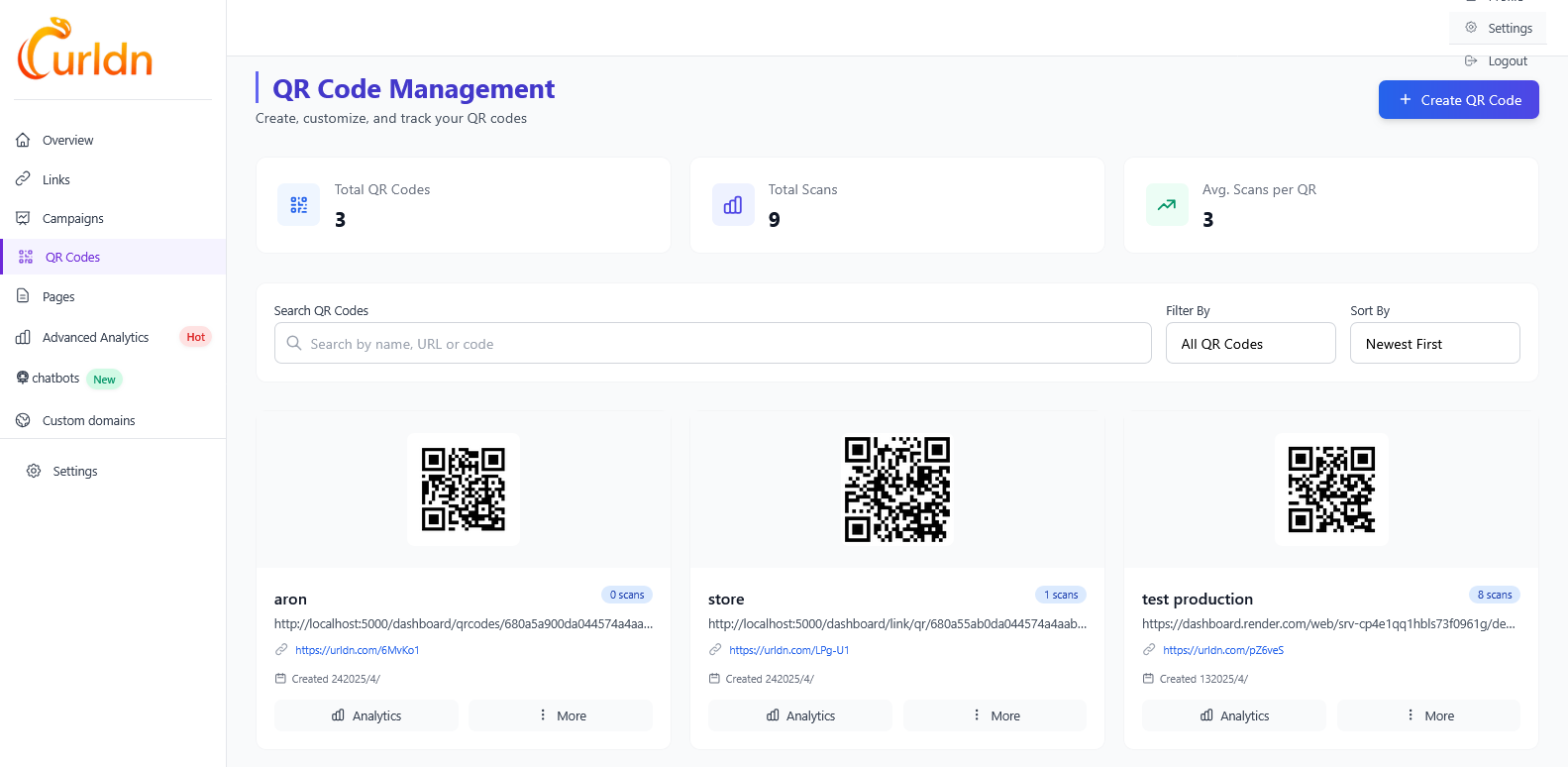
Our QR code generator offers:
- Real-time scan analytics
- Custom branded domains
- Team collaboration features
- API integration
Frequently Asked Questions
Are QR codes free to create?
Yes, creating basic QR codes is often free using tools like our QR Code Generator. However, advanced features like analytics and dynamic updates may require a subscription.
Can QR codes expire?
Static QR codes do not expire as the encoded data is permanent. Dynamic QR codes can expire if the associated service or subscription ends, or if specifically set to expire by the creator.
How secure are QR codes?
While the QR code itself is just a visual representation of data, security risks come from the destination. Always:
- Check the URL preview before opening
- Look for HTTPS secure connections
- Be wary of requests for sensitive information
- Use trusted generators for creation
Do I need a special app to scan QR codes?
Most modern smartphones (iOS 11+ and Android 8+) can scan QR codes using their default camera apps. For advanced features or older devices, dedicated scanner apps are available.
Conclusion
QR codes have evolved from industrial tracking tools to essential components of digital-physical integration. Their ability to bridge offline and online experiences makes them invaluable for:
- Businesses: Enhancing customer engagement and tracking campaign performance
- Consumers: Accessing information and services with unprecedented convenience
- Developers: Creating innovative interactive experiences
As technology advances, we can expect QR codes to incorporate new capabilities like augmented reality triggers, multi-factor authentication, and IoT device pairing. By following best practices around security and user experience, organizations can leverage QR codes to create meaningful connections with their audiences.
Start Creating Professional QR Codes Today?
Join thousands of businesses using our platform for reliable, trackable QR codes with advanced features.

